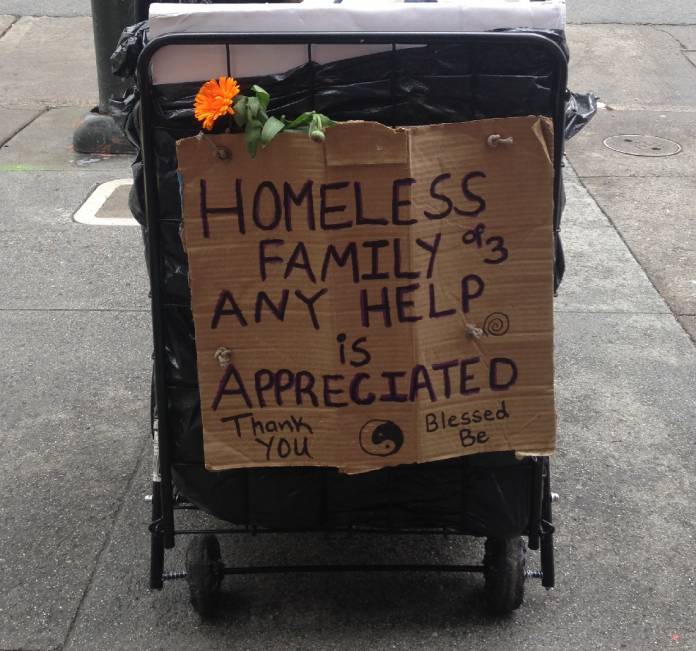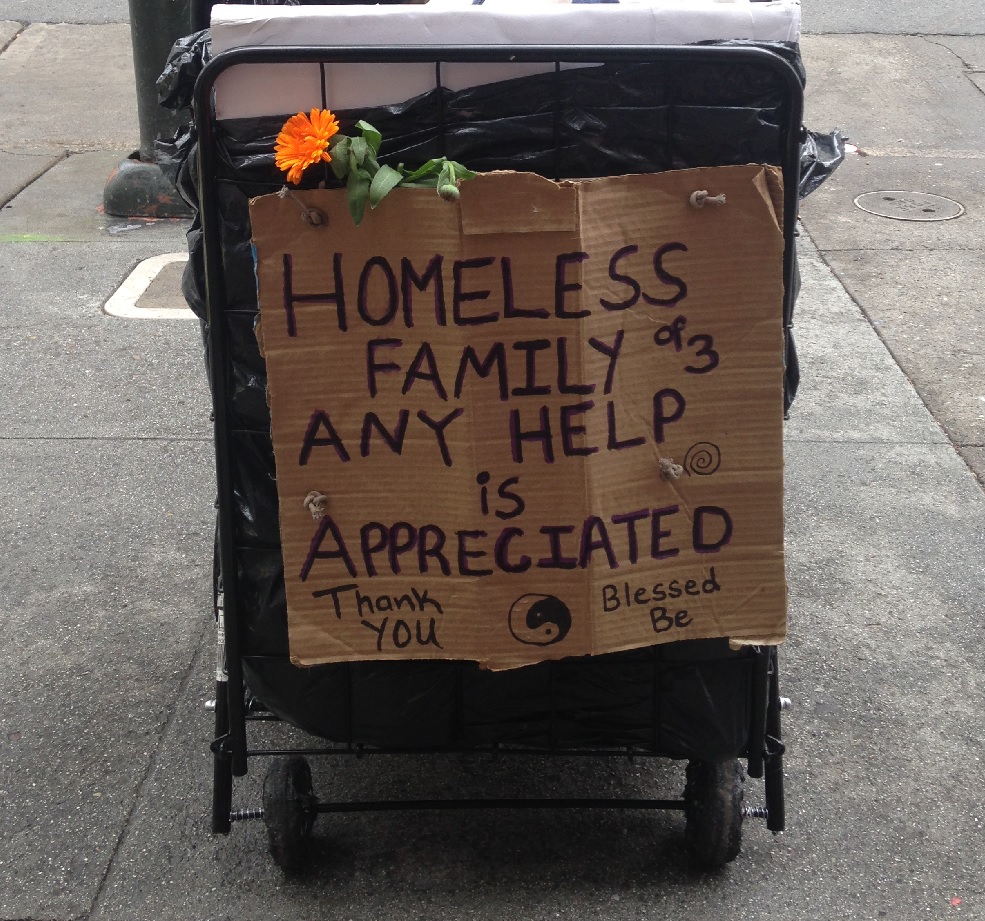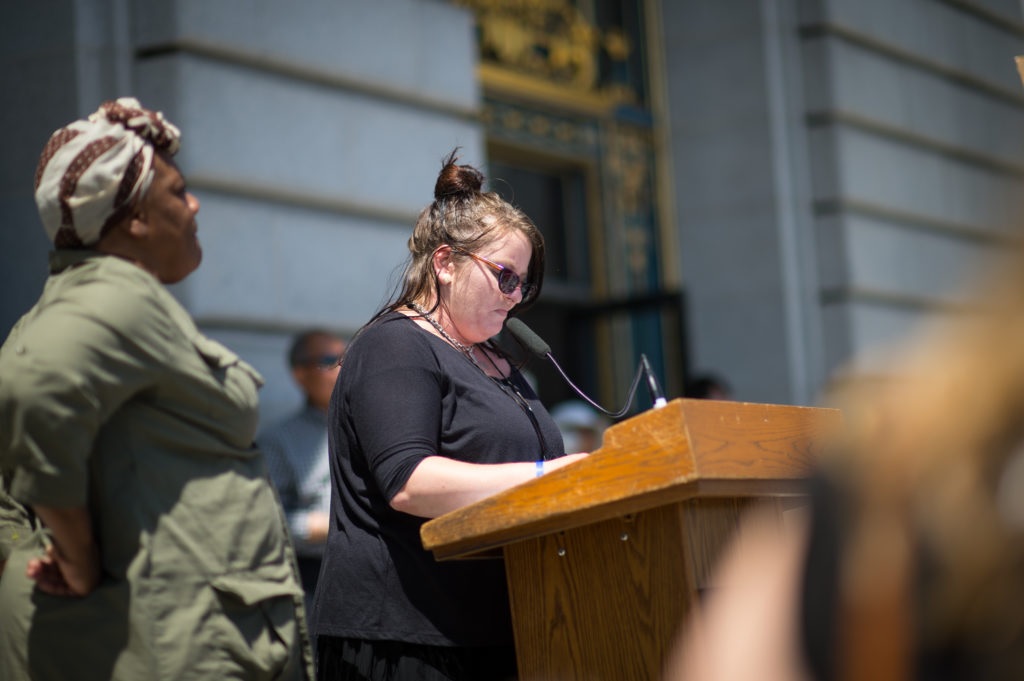
In 2010, my husband and I succeeded in graduating a drug program and closing our Child Protective Services case. Before our case was allowed to close, the courts mandated and assisted our family in acquiring a housing subsidy, which we put to use in the Bayview. At that time, the cost of our two-bedroom apartment was $1,800 per month. For four years, we resided there and barely ever saw the property management. But in 2014, the gentrification and the invasion of the techies raised rents and our property manager suddenly took interest in us and our apartment.

She took us to court five times and lost. We spent months in and out of the courtroom before agreeing to terms to leave. But having nowhere else to go, we’d violated the terms of our agreement, causing it to become an eviction, which meant we lost our housing subsidy.
The first week we were homeless began on November 22, 2015. My son and I slept in Providence shelter, an emergency shelter in the Bayview, while my husband slept in the park because of his social anxiety disorder. To stay at Providence, you have to arrive there early—6pm being what I was informed. My son’s after school program ended at 5pm.
That first week, my son and husband did not see each other once, after having spent my child’s entire lifetime with both parents in home. Thanksgiving weekend arrived, and I decided to stay in the park with my husband so that we could spend the holiday as a family. To accommodate my child, we gathered a ridiculous amount of cardboard, a tarp, subzero sleeping bags and built a shelter at Stow Lake with the cardboard beneath us. There was more cardboard along the sides to protect ourselves against the wind.
We slept there for three nights. It wasn’t much, but at least we could be together as a family.
Then, ten minutes before my alarm went off for my son’s school, we were awoken by a park ranger and told to tear down our shelter. While he stood there, we complied, leaving the area and hoping he would be satisfied and leave, but that was not the case. The moment he saw my son, he called the cops without asking any questions about our situation. There was no drug paraphernalia. We had food, warm clothing, and had provided wind and waterproof shelter as best as we could, but he took notice of none of that. I tried to take my son to school, but was told I could not. I wasn’t even permitted to take him to the restroom. We were made to wait for the arrival of CPS. Knowing what would transpire when CPS arrived, we put up a front for our son and acted as if everything was going to be okay.
The worker arrived, and it was time to try to explain to my son that he was going to be going to be taken away from us temporarily. It wasn’t our choice and there was nothing we could do to stop it. Terror and tears filled his eyes and he tried to run, but the ranger had ahold of him. He clung to me, crying and screaming, NO! The ranger attempted to drag him from me, kicking and screaming, but I told him that I would put my son in the car in an attempt on my part to minimize the trauma. As I placed him in the backseat and buckled his seatbelt, I looked him in the eye and made a promise that this would not be a long separation and that I would do whatever I had to make it so.
That was December 1, 2015.
Help us save local journalism!
Every tax-deductible donation helps us grow to cover the issues that mean the most to our community. Become a 48 Hills Hero and support the only daily progressive news source in the Bay Area.

As they drove him away, I collapsed to the ground and broke down. Two days later in court, the judge said that if I went into another drug program, he would be returned to me immediately. Without ever receiving any evidence of recent drug activity, I was required to go to a drug program simply to be off the streets.
December 9th, I entered the Women’s HOPE, a residential treatment program for women with children run by Healthright 360. During that time, I was separated from both my husband and my child. My child was placed back into my care on December 21st.
I spent three months there before going to Ashbury House, another residential treatment program, where I stayed for one year. CPS stayed involved with me from December 2015 till January 2017. My case was closed three months prior to me leaving Ashbury House despite the fact that where we would go once my time was up at Ashbury House was still a mystery. But I was no longer CPS’s problem. They’d successfully pushed me onto someone else, who openly admitted that they did not—and would not—find housing for their graduates. At the same time, I’d been working with Homeless Prenatal Program and was waiting until I had one month left at Ashbury House before I could get onto the waitlist for a three-to-six month stabilization room for me and my family at Compass Family Services.
Despite being legally acknowledged as being homeless, when you are still staying at a treatment facility, that’s not enough. I had to actually be outside before I could even be placed on this list. After I left Ashbury House, we were forced to stay at an emergency family shelter called First Friendship. First Friendship happens to be closest to my son’s school. I wasn’t told how long we would have to stay at the emergency shelter before the mental health and medical verifications we provided for priority access to the three-to-six-month stabilization room would be accepted. It wasn’t until we’d been staying at First Friendship for three weeks that we were informed that the paperwork we’d provided wasn’t good enough for processing. There was a specific form that we need our healthcare providers to fill out. We’ve since done that and are still awaiting the reply from Compass.
Compass has also informed me that the families who are sleeping in tents or vehicles are given first priority. Second priority are the emergency shelters like First Friendship and so on. The six-to-eight-month wait for a stabilization room being so excruciatingly long as it is, so families who hear this are actually doing this and sleeping outside, which endangers their children, not just from CPS, but also thieves, murderers, rapists, and other dangers from the streets. They only move a maximum of four families a week into the three-to-six-month stabilization room.
Did you know that if you decide to stay at a hotel or on a friend’s couch and you tell Compass you are doing so, you are temporarily removed from your spot on the list? This is one of the things that my family does to get some respite from sleeping in the emergency family shelter. At the beginning of the month, when my husband and I receive our SSDI government checks, we rent a cheap hotel room until our money runs out after a week or so. It’s an escape from the horrible conditions of the shelter.
Those of us who endure the emergency shelter sleep with ten to 15 other families all on mats on the hard linoleum floor. There are no shower facilities, no microwaves, and no beds. We are provided with the minimal basics. A mat, blankets, a small meal for dinner and sometimes breakfast. At 9 pm we are made to turn off our cellphones and the lights are turned off. I pity the women who have toddlers or infants that aren’t yet ready to be quiet and are made to go into the nursery with their children until they quiet down. The nursery is only a few hard chairs, a changing table, and a nightlight. We can still hear the crying in the main room.
As far as the staff go, I feel most of them are fair or try to be fair. They are not in any way warm or inviting; at best, they are rather intimidating. The whole experience is, but as they get to know you they become less intimidating and more human. I imagine it’s a difficult job witnessing children and families at the bottom of society’s totem pole.
Sleep there is difficult to say the least. With so many in one room, you hear snoring, babies crying, staff moving about. You are woken up many times each night. Each morning, you are required to get up, clean your area, and take all of your belongings and leave by 7 am, returning to the streets until the afternoon when you can again return.
I just would like to move forward. I may have made mistakes in the past, but I have been more than trying to make up for them. I did everything I was told I had to do and then some. I’m actively pursuing opportunities of agencies and trying to find someone who will help me, filling out applications, going to appointments — and there is still no forward momentum. That’s the hardest part about all of this. Our family puts so much effort into trying to get housing and still, we have nothing come out of it.
To Mayor Ed Lee, please stop ignoring families. We won’t go away. If you ignore homelessness, it doesn’t make it disappear.
This story also appears in the Street Sheet
